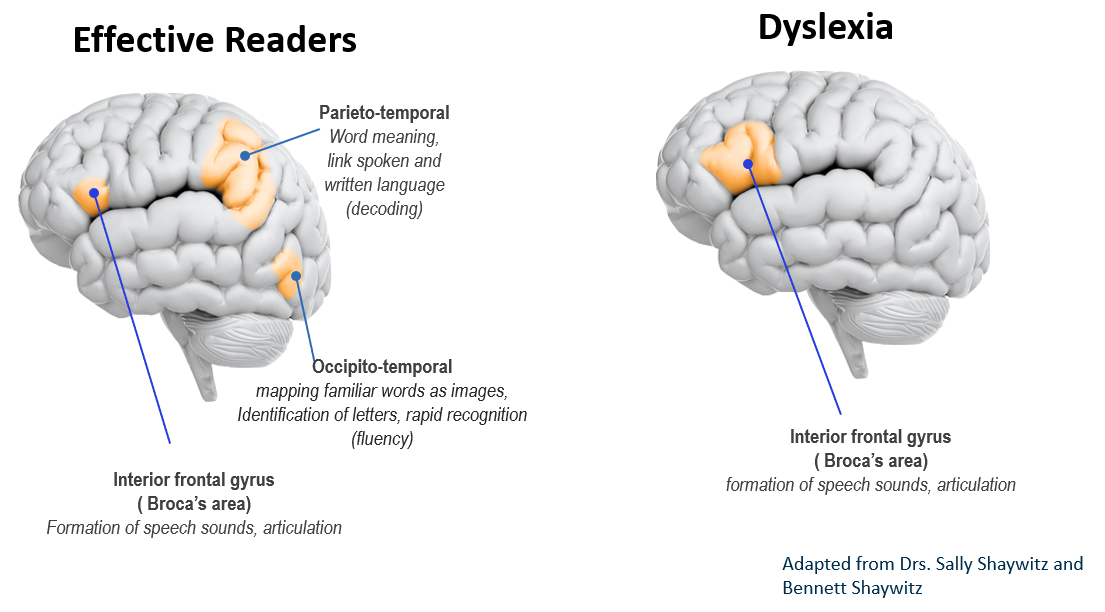
Dyslexia Resources
Reading disability affects approximately one in five children
What is Dyslexia
“Dyslexia is a specific learning disability that is neurobiological in origin. It is characterized by difficulties with accurate and/or fluent word recognition and by poor spelling and decoding abilities. These difficulties typically result from a deficit in the phonological component of language that is often unexpected in relation to other cognitive abilities and the provision of effective classroom instruction. Secondary consequences may include problems in reading comprehension and reduced reading experience that can impede growth of vocabulary and background knowledge.”
- International Dyslexia Association
The Dyslexic Brain
Turning on the Brain
Research has shown that reading requires specific language centers in the brain to be activated and connected with each other. Effective readers utilize three primary language centers on the left side of the brain that connect speech sounds to print and store sight words and meaning. For those with dyslexia, the language centers are often under-activated. Specific types of reading instruction are necessary to “wire” these parts of the brain to develop reading proficiency.
We were privileged to have the Emmy-Nominated Actor Ameer Baraka be the keynote speaker for our Rise Gala event on Sept. 30th, 2023. His story, which he has written about in his book, “Undiagnosed, The Ugly Side of Dyslexia”, is both tragic and hopeful—and it speaks to the importance of identifying dyslexic children when they are young, before they start to have negative feelings of rejection and self-doubt. We need to disrupt the school to prison pipeline, and give every child the opportunity to become literate! You can hear the audio of Ameer’s powerful talk here:
Our Journey Through Dyslexia:
Rise Parent Webinar, June 2023
From the RISE Webinar with Mary Beth Gilliland, M.Ed.
Watch the webinar on our RISE YouTube Channel: https://www.youtube.com/watch?v=Df540xDKy3Q
Advocacy Resources for the Parents of Struggling Readers
Books about Dyslexia
- "Dyslexia Advocate! How to Advocate for a Child with Dyslexia Within the Public Education System" by Kelli Sandman-Hurley
- "What to do about Dyslexia: 25 Essential Points for Parents" by Richard Selznick, Ph.D.
- "Overcoming Dyslexia" by Sally Shaywitz, MD
- "Special Education Savvy: The Mom’s Guide to Mindset and Effective Advocacy Throughout the IEP Journey" by Mary Beth Gilliland, M.Ed.
Websites dedicated to Dyslexia
- Understood.org
- Center for Parent Information & Resources
- Wrightslaw Special Education Law and Advocacy
- International Dyslexia Association
Helpful Links about Dyslexia
- Accommodations for Students with Dyslexia
- Advocating for Students with Dyslexia in Public School
- Dear Colleague: Dyslexia Guidance Memo (OSERS, 2015)
Federal Regulations
More Dyslexia Resource Links
Dyslexia Podcasts
The Emotional Impact of Undiagnosed Dyslexia, Part I
Shame is a powerful emotion. Recently, the role of shame and its impact on struggling readers is gaining awareness. This two-part episode will share the stories of four adults and how undiagnosed dyslexia caused anxiety and shame-based trauma in their lives.
The Emotional Impact of Undiagnosed Dyslexia, Part II
Shame is a powerful emotion. Recently, the role of shame and its impact on struggling readers is gaining awareness. This two-part episode will share the stories of four adults and how undiagnosed dyslexia caused anxiety and shame-based trauma in their lives. This is part 2 of this episode.
Podcasts by Educational reporter Emily Hanford
"Sold A Story" Podcast
There's an idea about how children learn to read that's held sway in schools for more than a generation — even though it was proven wrong by cognitive scientists decades ago. Teaching methods based on this idea can make it harder for children to learn how to read. In this podcast, host Emily Hanford investigates the influential authors who promote this idea and the company that sells their work. It's an exposé of how educators came to believe in something that isn't true and are now reckoning with the consequences.
"What the Words Say" podcast
Many kids struggle with reading – and children of color are far less likely to get the help they need. “If you can’t read well in the early grades it really starts to have negative consequences on your social emotional development and your behavior.” Paul Morgan



